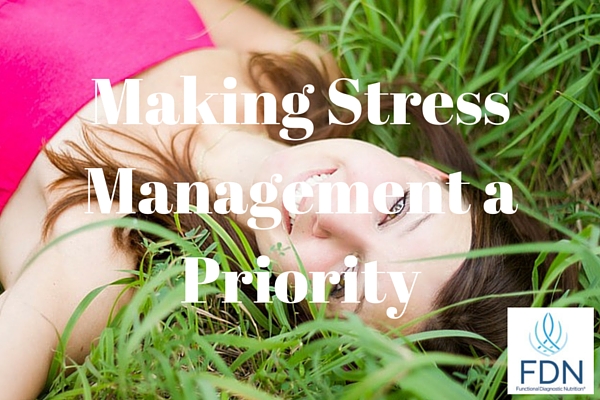As Functional Health Coaches, clients come to us because they want to improve their health. Many have been struggling with nagging health issues for years, and many have been to see multiple doctors and haven’t gotten the answers or the relief that they are looking for. But what is the one causal factor of the health issues that people are dealing with daily? What is it that ultimately creates the symptoms that they suffer with?
Stress! Stress is a far greater player in the health of individuals than most people are aware of. And yet 70-80% of all doctor’s office visits are the result of stress. And yet, not only are most people not aware of the far reaching implications of chronic stress on their health, but most people do not include regular forms of stress management in their daily lives. Stress is so far reaching that approximately 75% of all Americans experience either physical or psychological symptoms related to the stress they are dealing with daily.
Stress is the natural way that a body protects itself from threats. The threats may be real or may be imagined. Threats may be physical, mental or emotional. When we encounter a stressor, the nervous system releases a variety of chemicals such as adrenaline and cortisol, which bring a burst of energy to the body. The heart will begin to beat more quickly, the muscles will tighten, blood pressure will begin to rise, the breath will begin to speed up and become shallow, and all of the senses will sharpen. These reactions help to increase stamina and strength, increase focus and speed up reaction time so that a person can face the threat or run. This is known as the fight or flight response.
But it’s chronic stress that is causing the health problems that are becoming so common these days. This type of stress is long term and can last for weeks, months or even years. It is this form that wears people down and creates serious physical and mental health issues. Some of the things that can cause stress to become chronic are chronic pain, death of a loved one, divorce, financial troubles, job loss, long periods with too many obligations, being in a toxic relationship, being a worrier, living with low self-esteem, work problems. It shouldn’t be a surprise that money and work are the two top sources of chronic stress followed closely by relationship issues.
The biggest problem with chronic stress however, is that your clients can become accustomed to it. It becomes such a normal part of life that they no longer recognize that it is there. That is where the harm is done on a person’s health.
According to a 2007 study from the American Psychological Association, the top physical symptoms of chronic stress include:
- Fatigue
- Headache
- Upset stomach
- Muscle tension
- Change in appetite
- Teeth grinding
- Change in libido
- Dizziness
The top psychological symptoms include:
- Feeling irritable or angry
- Feeling anxious
- Experiencing a lack of energy
- Feeling like you want to cry
But it is also compromising the quality of sleep that people are getting as 48% of Americans report having difficulty sleeping and lying awake at night as a result of stress. The resulting sleep deprivation further negatively affects a person’s quality of life and health, which in turn increases health care costs.
As Functional Health Coaches, it is vital that we help our clients to make stress management a priority. Most people are simply unaware of how detrimental stress is to their health and how it has contributed to the health issues they currently face.
Some stress management options that clients can use:
- Meditation. This is one of the most effective ways to manage stress in the long term. Meditating for as little as 10 minutes a day can help to shut off the body’s stress response and begin re-balancing stress hormones.
- Deep breathing. Deep breathing exercises are the quickest way to stop a stress response.
- Exercise. While more intense cardio and strength training exercise can actually raise stress and stress hormone levels, exercise such as yoga and Tai Chi are wonderful ways to reduce stress levels.
- Practicing gratitude. Studies have shown that practicing gratitude cultivates a more optimistic view of life, which in turn reduces stress.
- Laughter. Laughing triggers the release of endorphins and neurotransmitters such as serotonin that help to reduce stress and make a person feel better.
- Technology fasting. We are attached to technology 24/7. But all this access to information means that we are constantly being stimulated by input. This can cause stress. So taking a break from technology (smart phones, tablets, computers, television, video games, mp3 players) can actually give our nervous system a break from the stimulation, and lower stress levels.
- Creative therapy. Doing an art or craft project can be very soothing when you’re stressed. One of the most popular forms of creative therapy today is coloring for adults. Doing a creative project allows you to slow down and gives you a break from the business of the day.
- Getting out into nature. Going outside and spending time in nature, getting fresh air and sunshine, all help to reduce stress levels.
Helping clients find a form of stress management that works best for them is the key to helping them restore their health and vitality. Help them to understand their options and to find the best way to fit stress management into their lives daily.







